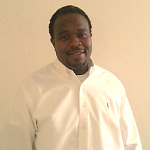Camelot Profile: Phoenix Excel Academy Co-Teachers David Kase and Danielle Degnan

David Kase and Danielle Degnan are co-teachers at Phoenix Excel Academy.
David Kase has a B.A. from the University of Maryland and has taught in high schools for a number of years, including ones in Miami, Fl. and Pottstown,Pa. He’s been teaching for Camelot for two years.
Danielle Degnan graduated from Cabrini College in 2012 with a B.A. in Special Education and Elementary Education. She co-teaches grades 9-12 at Camelot’s Phoenix Excel Academy and has been there for three years.
What is it like co-teaching a class?
DK: Because we have vulnerable children, some of the population is in more need of assistance than others. A class that has more academic issues needs more learning support and they try to create the classes so one class is heavier. So I’ll have two T-9 classes and one class will have very few kids that need learning support and the other class will be heavier in learning support and that’s where she’ll be in that class, utilizing her talents. It’s basically a way of funneling her time into the most affective time appearance as possible.
DD: I work with him two times a day in 9th and 10th grade, and we’ve been working together for about three years. In that time, we’ve really started evolving a cohesive relationship in the classroom so I focus more on the vocabulary portion and he focuses more on the literature portion. It’s an 80 minute class so usually we try to split it up. I usually start off and we’ll all go into vocab and do vocab activities and he’ll support me in that. Then he’ll go into more of the literature, the reading and the figures of speech, and I support him when he’s talking. We both move around the classroom. So right now, especially when new students come in, we’re both automatically in there, and they can’t tell who the teacher is except for the fact that it says Mr. Kase on the door.
How would your students describe you?
DD: Loud. [laughs] Hyper, in the good sense of the word. Students who do get along with me would definitely describe me as loud, as outgoing. I’m always in the front of the room, I’m always talking to everybody, I try to be sarcastic and funny, and if there’s an issue I try to deal with it first with humor and getting them in a better mood. But I am very strict in the sense that I do have the norms put in place and if you don’t follow them then there are repercussions for that.
DK: I think I’m firm but fair. I don’t pick favorites. I’m not overly strict but I want them to stay focused on the task, so I have to be firm with them to make sure they stay on point. I look at every kid the same as every other in the class, I don’t play favorites. I try to be nurturing and have energy; I try to outwork them. I can have fun but the main thing is they know I care.
And how would you say they describe your co-teacher?
DK: Well she’s a bit younger than me so there’s a change in dynamic there even just between she and I. She’s a little funkier, a little livelier. I don’t want to say she can relate to them better but she is closer in age to them, so I’d say there’s that similarity in personality in the sense that they have that bubbly and kind of lively, energetic way about them. I think she’s very compassionate with the kids. I believe she truly cares. And I think that’s an important component in being a teacher. Kids need to know that you really care. That you’re investing in their future.
DD: In our classroom I’m kind of more the “mom” in the sense that I can be really strict but I’m usually the one who’s like “okay, stop, calm down, we’re going to keep moving forward.” Mr. Kase will sometimes claim that I baby them (which maybe I kind of do) but he’s more of the disciplinarian in the sense that he likes the way his classroom is run. It has become a good balance with the two of us, where he’s more “these are the rules and this is what we’re going to do today,” which is great because we don’t have any major issues in our classroom ever.
What’s the most gratifying aspect of your position?
DD: My favorite thing is when they get it. You have students that can be difficult, who you go back and forth with, or they come in and they don’t think highly of themselves. They start to work with their program and really start to succeed. For me, that’s the best thing. When I can look back at their history and see that they’re being so successful here, and they’re earning it. It’s not like we’re pushing them through—they earn all of their grades.
DK: I think that a lot of these kids really have nothing to hold onto. They’re not privileged children and a lot of people have already bailed on them, given up on them and that’s why a lot of them are here. And I think that by showing enthusiasm, by showing sincerity in teaching these kids, and that we care about their future and education that hopefully some of that will absorb into them, that they’re not alone, they’re not by themselves, and that there’s someone in their life who cares where they’re going and how they do.
What are some of the biggest challenges you face?
DK: Home life is a big issue in the sense that it creates a lot of instability in the classroom. Something happens and they’re not in class. Instability in their own personal lives creates attendance issues. That creates a lot of problems because you’re constantly walking this fine line between, “Is this something that wasn’t their fault?” or “Is this a kid that just doesn’t want to show up?” That continuity of keeping a regular class regular, and moving throughout the day, the week, the month with all these little potholes becomes a challenge.
DD: Our students are in high school so they’ve already been thrown around a lot in their educational past. They have this really negative attitude towards school when they come in, and they’re in those teenage years which are difficult no matter where you are. Being able to get them to think differently is the challenge. There’s always a pushback. When we’re introducing topics that they don’t understand and they’re shutting down and trying to get them to engage in that and learn, then you can get attitude back. But I think the hardest thing is getting them to want to learn, especially at their age, because it’s so easy for them to drop out, and they know it, and they know so many other people that have.
How do you combat these kinds of challenges?
DK: I try to hold them accountable for their actions, meaning if there’s a real emergency then they need to let someone know so we can deal with it as best we can. But I don’t play favorites, like I said earlier. Like, if a kid’s not coming to school just because he’s not coming to school then that’s something that he needs to take ownership of. That shows the other kids that I care about them, but I’m not going to give them a free pass. If you give a kid a free pass, just because they choose not to do something, that sends the wrong message to the kids that are doing the right thing, so I need to be consistent.
DD: For me, it’s always been not giving them bookwork all the time, and having them be engaged in the lesson and doing exciting things—saying “Hey if you guys can get through everything this week and do a really good job, then we can do X-Y-Z thing on Friday.” I think for them, a lot of it is an emotional barrier, where it’s not like they can’t do it, it’s that emotional barrier where you have to say “It’s okay, you can trust me, it’s okay to be wrong, it’s okay if you don’t know it, I’m still going to help you.” But being positive always helps too. Raising your voice, I’ve learned, doesn’t help in a situation. If you can’t get past that emotional barrier, they’re not going to care about what you’re doing. And food! “If you guys do this, everyone gets a piece of candy!” I swear they’ll all try.
What do you think makes the Camelot model so successful?
DK: I think that the main component is the way we’re organized. We’re extremely consistent in our organization, meaning we don’t bend the rules, or shade things to be more convenient. We say “these are the standards that we’re adhering to,” and it creates a sound foundation for these kids. A lot of these kids have a disruptive home life and when they come here it’s the complete opposite. We have a very structured environment and it’s consistent; it doesn’t change from one day to the next. So they know what they’re getting when they come here. And our teachers constantly have the future in mind. When I taught at public school there were times I didn’t see my colleagues for weeks or I wouldn’t speak to them. There was never this unifying theme of “What’s our direction?” it was always just getting a message from the principal but we didn’t really sit down and talk about how we were going to serve the kids—at Camelot we do.
DD: And I think the fact that we talk to the kids. They’ll talk to us about how in their previous schools if they did do something they would act out, they would be kicked out or get suspended. With us, it is not, “get out, goodbye, we’ll see you in a week,” it’s “why did you do that, what is wrong, what can we do to help you?” The point of this is not for us to give up on you or for you to fail; the point is for you to graduate. And you see people do that.



